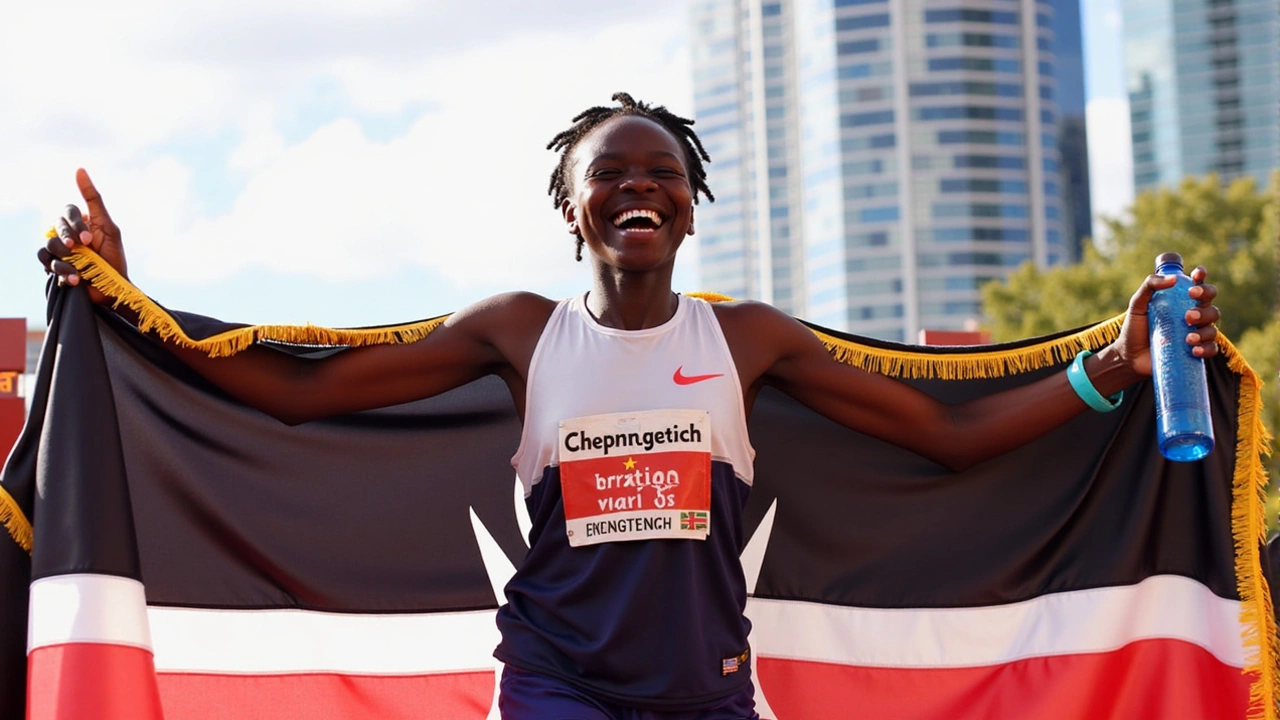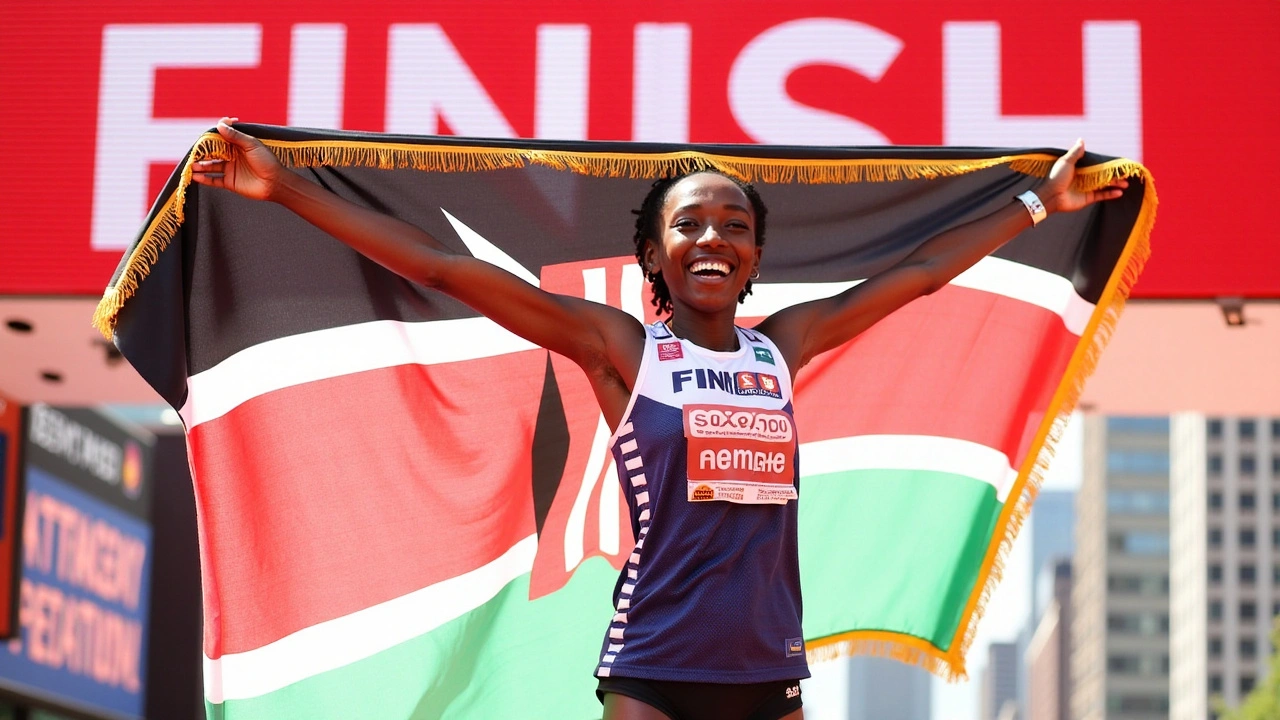Ruth Chepngetich Smashes Women's World Record at Chicago Marathon; John Korir Triumphs in Men's Race

Breaking Boundaries: Ruth Chepngetich's Historic Win at the Chicago Marathon
In an astonishing display of endurance and talent, Kenya's Ruth Chepngetich etched her name in the annals of marathon history by shattering the women's world record at the 2024 Chicago Marathon. Clocking in at a blistering time of 2:09:56, Chepngetich decimated the previous record of 2:11:53 held by Ethiopia's Tigst Assefa. Her achievement is made all the more remarkable considering she was not selected for the Kenyan Olympic team for the Paris Games. Despite this, she channeled her disappointment into a stunning victory that has resonated across the world of athletics.
Chepngetich's record-breaking performance did not come without a personal dedication. She honored the late Kelvin Kiptum, a fellow Kenyan runner and world-record breaker, who sadly passed away in a road accident earlier this year. By dedicating her remarkable achievement to Kiptum, she not only celebrates her own success but also pays tribute to a dearly missed compatriot, making the event even more poignant.
A Near-Perfect Performance
The 2024 marathon saw Chepngetich leaving her competitors in the dust from the very beginning. Her half-marathon split time of 1:04:16 was not only the fastest ever recorded on U.S. soil but set a precedent for what was to come. As she powered through the race, her pace was relentless and appeared nearly unsustainable. However, Chepngetich maintained her energy and resolve with astonishing precision, clocking impressive times for every segment.
The 5-K segments saw her achieving times of 15:18, 15:19, 15:26, and 15:32, demonstrating her consistent pace. Even as she slightly slowed between the 30-K and 35-K mark to 15:43, she proved her tenacity by increasing her speed in the subsequent segment. Her final sprint to the finish was nothing short of extraordinary, pushing her past the tape with a time that placed her firmly in the record books.

John Korir Dominates the Men's Event
In the men’s division, it was another day of glory for Kenya as John Korir delivered an impressive win with a finishing time of 2:02:43. His performance not only earned him the top spot but also marked the second-fastest time ever achieved at the Chicago Marathon, trailing only the legendary efforts prior. Korir's victory was characterized by a strategic execution and powerful strides that distanced him nearly two minutes from Ethiopia's Huseydin Mohamed Esa, who finished with a commendable time of 2:04:39, securing second place. Completing a competitive top three, Amos Kipruto, also from Kenya, crossed the line at 2:04:50, rounding off a strong showing by Kenyan athletes.
Wheelchair Division Highlights
The Chicago Marathon also celebrated athletic prowess in the wheelchair races. Switzerland shone through the resilient performances of Marcel Hug and Catherine Debrunner. Hug took home the gold in the men’s wheelchair division, finishing in 1:25:54, narrowly ahead of the USA's Daniel Romanchuk by just four seconds. Meanwhile, Debrunner delivered an awe-inspiring performance in the women's race, breaking her own course record with a time of 1:36:12. Her accomplishment not only earned her the victory but also demonstrated her exceptional ability as she finished an impressive three minutes ahead of fellow Swiss competitor, Manuela Schär.

The Global Stage: Chicago Marathon’s Impact
This year's Chicago Marathon was more than just a race; it was a convergence of elite talent from across the globe, forming a part of the Abbott World Marathon Majors. As a World Athletics Platinum Label road race, it attracted the crème de la crème of athletes, making it a spectacle watched by millions worldwide. The marathon not only showcased exceptional athletic prowess but also underscored the spirit of determination, resilience and unity.
The Chicago Marathon continues to be a beacon of athletic excellence and a platform where records are not just broken, but shattered. It highlights the ongoing evolution of human athletic capabilities, pushing boundaries and setting new standards for the future. Through perseverance and passion, athletes like Ruth Chepngetich and John Korir remind us of the heights that can be achieved and inspire the next generation of runners to strive for greatness.
Wow, what an inspirng moment for the running community! Ruth's dedication shows that setbacks can fuel greatness, and John’s steady strategy proves depth in Kenyan distance running. It’s amazing how athletes turn personal loss into triumph, honoring Kelvin while pushing the limits. Let’s celebrate this milestone together and keep supporting diverse talent across the sport.
The moment the finish line flashed, the world didn’t just see a record-it saw a meticulously engineered spectacle. You have to wonder who's pulling the strings behind the scenes, the shadowy sponsors, the hidden performance enhancers. These “miraculous” splits are too clean, too perfect, like a pre‑programmed algorithm running on a treadmill. I can’t shake the feeling that there’s a covert agenda rewriting history while we applaud.
The kinetic output observed aligns with a supra‑optimal lactate threshold and demonstrates a micro‑periodization model that outperforms canonical macro‑cycle designs. Sub‑2‑hour marathon thresholds are no longer theoretical in the presence of bio‑feedback loops and aerodynamically tuned footwear.
The performances were outstanding, and the split times were recorded accurately. The athletes demonstrated disciplined pacing and effective energy distribution throughout the race.
Ruth Chepngetich’s conquest of the Chicago Marathon reads like a modern epic, a tale of perseverance that reverberates far beyond the asphalt streets of Illinois.
From the moment she launched into the first mile, the crowd sensed a seismic shift in the air, as though history itself were turning a new page.
Her half‑marathon split, a flawless 1:04:16, shattered previous expectations and sent ripples through the global athletics community, igniting spirited discussions on human potential.
Each subsequent five‑kilometer segment unfolded with the precision of a finely tuned metronome, the cadence never wavering despite the draining fatigue that inevitably stalks any runner of such caliber.
The subtle deceleration between 30 km and 35 km was not a sign of weakness but a strategic recalibration, allowing her muscles to recover just enough to unleash a ferocious surge in the final stretch.
As the finish line loomed, she summoned an almost mythical reserve of speed, propelling herself beyond the tape with a finish time that will be etched in the annals of sport forever.
The dedication she offered to the late Kelvin Kiptum added a poignant layer of emotional resonance, transforming a personal victory into a collective tribute to a fallen legend.
Meanwhile, John Korir’s methodical domination of the men’s race underscored Kenya’s deep reservoir of distance talent, his controlled surge creating a palpable gap that left his competitors in a shadow of his own stride.
The wheelchair division, too, provided a stunning showcase of resilience, with Marcel Hug and Catherine Debrunner delivering performances that challenged preconceived notions of speed and endurance.
As spectators, we were privileged witnesses to a convergence of raw talent, meticulous preparation, and heartfelt homage that elevated the marathon beyond mere competition.
The ripple effects of these achievements will undoubtedly inspire a new generation of runners, eager to test the boundaries of what the human body can achieve.
Moreover, the strategic pacing illustrated in this race offers a case study for coaches seeking to refine training regimens in an era dominated by data analytics.
In the broader context of the World Marathon Majors, these records serve as milestones that propel the sport toward ever‑higher echelons of excellence.
The narrative of triumph over adversity, woven through each athlete’s journey, reinforces the timeless truth that dedication, coupled with unwavering belief, can rewrite the script of possibility.
As the sun set on Chicago that day, the echoes of cheering crowds lingered, a reminder that the spirit of the marathon endures long after the last footfall fades.
Finally, let us carry forward the inspiration we have been gifted, nurturing the flame of ambition in runners worldwide, for the road ahead is paved with endless potential.
Great insights! The split data suggests an optimal VO2max utilization, and the negative split approach aligns with contemporary periodization frameworks. It’s fascinating how pacing strategy translates to physiological efficiency, especially when considering carbohydrate oxidation rates during the final kilometers. Keep the analysis coming-we can learn a lot from these metrics.
The analysis correctly identifies the pacing strategy, but it overlooks the influence of altitude training on oxygen utilization, which likely contributed to the record‑breaking performance.
Ruth’s run was lit, cant beat that!
While the achievements are commendable, it is essential to contextualize them within the broader spectrum of athletic performance, acknowledging both the advances in technology and the inherent physiological limits that remain.